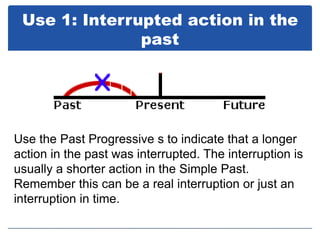
Past progressive
- 1. Use 1: Interrupted action in the past Use the Past Progressive s to indicate that a longer action in the past was interrupted. The interruption is usually a shorter action in the Simple Past. Remember this can be a real interruption or just an interruption in time.
- 2. Use 1: Interrupted action in the past • I was watching TV when she called. • When the phone rang, she was writing a letter. • While we were having the picnic, it started to rain. • What were you doing when the earthquake started? • You were not listening when I told you to turn the TV on • When John was sleeping last night, someone stole his car. • Sammy was waiting for us when we got off the plane. • A: What were you doing when you broke your leg? B: I was snowboarding.
- 3. Use 2: An action in progress at a certain time in the past 8:00 pm x • You can use the Past Progressive to talk about an action that started before a certain time in the past and was still in progress at that time.
- 4. Use 2: An action in progress at a certain time in the past 8:00 pm x • I was watching TV yesterday at 8:00 pm • What were you doing on Saturday at 10:00 pm • At 7:00 am Mr. Herbert was reading the newspaper • We weren’t doing anything important in the morning
- 5. Use 3: Parallel actions • When you use the Past Progressive with two actions in the same sentence, it expresses the idea that both actions were happening at the same time. The actions are parallel.
- 6. Use 3 Parallel actions • I was studying while he was making dinner. • While Ellen was reading, Tim was watching TV • Were you listening while he was talking? • I wasn't paying attention while I was writing the letter, so I made several mistakes. • What were you doing while you were waiting? • Thomas wasn't working, and I wasn't working. • They were eating dinner, discussing their plans, and having a good time.
- 7. Affirmative sentences Subject Verb to be -ing in past I was playing You were studying He, She, It was eating We were dancing You were walking They were working
- 8. Negative sentences Subject Verb to be not -ing in past I was not playing You were not studying He, She, It was not eating We were not dancing You were not walking They were not working
- 9. Questions Verb to be Subject -ing in past was I playing? were You studying? was He, She, It eating? were We dancing? were You walking? were They working?